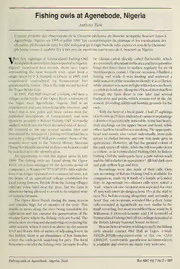
Fishing Owls at Agenbode, Nigeria PDF
Preview Fishing Owls at Agenbode, Nigeria
Fishing owls at Agenebode, Nigeria Anthony Turk L'auteur presente des observations de la Chouette-pecheuse de Bouvier Scotopelia houvieri faites a Agenebode, Nigeria, en 1995 et juillet 1999- Les caracteristiques du plumage et les vocalisations des chouettespecheusesdecettelocaliteindiquentqu'ils’agitbiendecetteespeceetnondelaChouette- pecheuse rousseS. ussheri. IIya tres peu de mentionsanterieures deS. houvieriau Nigeria. V’ery few sightings of Vermiculated Fishing Owl be Clarias catfish (locally called flat-heads), which ScotopeliahouvierihavebeenreportedinNigeria. areextremelyabundantinthisareaandhaveprimitive Elgood3 mentioned four records, those near Lagos lungs that force them to surface regularly for air (R representing the most westerly ever, apart from a Markhampers.comm.). Ononeoccasion, Iflusheda single taken by F X Stampfli in Liberia in 1885, and fishing owl while it was feeding and retrieved a considered 'undoubted' by Bannerman2 but sufficientpartoftheremainstoidentifyitasaClarias , questionedbyGatterLThisistheonlyrecordwestof whileanotherwasseeninflightwithwhatwasclearly theTogo-Benin Gap. acatfishinitstalons.Alongthec9kmofriverthatflow In 1995, Phil Hall observed a fishing owl near a through the farm there is one lake and several villageonthebanksoftheOgweRiver, atributaryof backwaters and pools, which remain wet in the dry the Niger, near Agenebode, Nigeria. Hall is an season, providingadditionalhuntinggroundsforthe experienced andvery knowledgeable observer, and owls. noted that it was paler and more rufous than the Withthe help ofa localguide, I had 27 sightings published descriptions of Vermiculated, and was of8-9owlsin25days.Individualvariationinplumage therefore possibly a Rufous Fishing Owl Scotopelia colorationwasextremelynoticeable.Somehadheavy, ussheri which has notbeenrecordedeastofAccraL dark markings on the upper breast and head, while , He returned to the site several months later and othershadlessbroadbrownstreaking.Theupperparts, discoveredtheremainsofafishingowlthathadbeen head and mantle also varied individually, from pale eaten by a villager(P Hall pers comm). Some ofthe rufous to darker brown; and one was quite grey in remains were sent to the Natural History Museum appearance. However, all had the ground colour of (Tring)foridentificationbutnofirmconclusionscould theunderpartsoff-white,whilethebillwaspalecream be reached astothe identification. toyellow, as inVermiculatedFishingOwl. InRufous An opportunity to visit this region arose inJuly Fishing Owl the underparts have a pale rufouswash 1999- The fishing owls are found along the Ogwe andthebillisdarkerinappearance1.Allhaddarkeyes River, on a farm managed by the Leventis group of and paleyellowlegs andfeet. companies,atWeppa(06°57'N06°35'E).Althoughthe Recordings were also made of their calls. Only farmisnolongeroperatedonacommercialbasis,itis one recording ofRufous Fishing Owl is available for the home of an agricultural college established for comparison, made byRRanft ofa female atLondon localyoungfarmers. Peoplefromthefishingvillages Zoo. At Agenebode two distinct calls were noted: a cultivate some land near the river, but the farm is ‘wail’, which onone occasionwas repeatedforover otherwisebeingallowedtoreverttoitsoriginalstate 45minwithintervalsrangingfrom 15 satthestartto ofGuinea Savanna. over70s,beforeceasingaltogether,and, secondly,a The Ogwe River floods during the rainy season ‘hoot’ that, on occasions, sounded like a duet. Some and remains high for c6 months of the year. This calls recorded at Agenebode are very similar to the results in areas along the river being unsuitable for Ranftrecording,butmostresembledthosemadebyR cultivation and has ensured the preservation of the Wilkinson, F Dowsett-Lemaire andJ M Lernould of riverineforestwherethefishingowlsarefound. The VermiculatedFishingOwl(allrecordingsdepositedat riverisslowmovingandmeanderingevenduringthe the BritishLibraryNational SoundArchive). rainyseason, when it rises 6 m above its dry-season Researchersorbirderswishingtostudythefishing levelandfloods 100sofmetresofadjoiningforest. In owls should contact Phil Hall in Lagos, e-mail: this habitat, there is an abundance oflow branches [email protected] or fax on: (234) where the owls perch searching for prey. The local 12691245. Comfortable guesthouse accommodation fishermenconsiderthefishingowls’favouritefoodto is available andvisitors are madeverywelcome. FishingowlsatAgenebode, Nigeria: Turk BullABC Vol7No2- 107 Acknowledgements I would like to thank A.P. Leventis and the Leventis Foundation for funding the study, Phil Hall for his logistical skills and advice, and Richard Markham, IITA, Ibadan, Nigeria. The International Owl Society provided equipment and Daniel Mochi assisted in locating the owls. The manuscript was significantly improvedbyhelpfulcommentsfromDrRichardShore and an anonymous referee, f. References 1. Atkinson, P.W., Koroma,A.P., Ranft. R., Rowe,S.G. and Wilkinson, R. 1994. The status, identification and vocalisations of African fishing owls with particular reference to the Rufous Fishing Owl Scotopelia ussheri. Bull.ABC1: 67-71. 2. Bannerman, D.A. 1933- TheBirdsofTropical West Africa.Vol3-London:CrownAgentsfortheColonies. 3. Elgood,J.H. 1994. TheBirdsofNigeria:anannotated check-list. BOU Check-list No. 4. Second edition. Tring: British Ornithologists' l:nion. 4. Gatter,W.1998.BirdsofLiberia.Robertsbridge:Pica Press. 5. Marchant, S. 1954. The relationshipofthesouthern Nigerian avifauna to those of upper and lower Guinea.Ibis96: 371-379. CentreforEcologyandHydrology'.MonksWood,Abbots Ripton, Cambs. PEI72LS, UK. Figure 1. Darkform ofVermiculated Fishing OwlScotopelia bouvieri, Agenebode, Nigeria (A.P. Leventis) Figure 2. More typical colourform ofVermiculated Fishing Owl Scotopelia bouvieri, Agenebode, Nigeria (A.P. Leventis) Figure 3. Flooded forest, Agenebode, Nigeria, habitat of Vermiculated Fishing Owl Scotopelia bouvieri (Anthony Turk) 2 108-BullABC Vol7No2 FishingowlsatAgenebode, Nigeria: Turk
